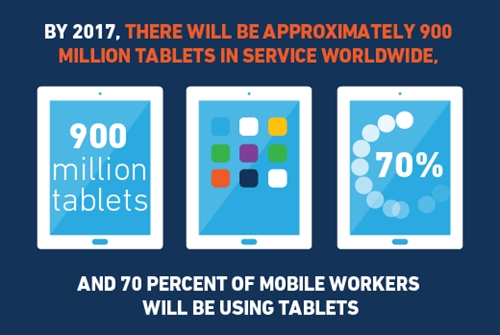Typically, when you think today about the potential for massive success in the mobile application market, your thoughts center around apps marketed directly to consumers. Perhaps you want to design a game – if you can come up with the next killer idea for an app like Angry Birds or Words With Friends, for example, you can become an instant success.
 The most common way to think of mobile marketing strategies is to focus on achieving greater popularity with individual people. If one person likes your game, and they share it with their friends or co-workers or classmates, and the word quickly spreads, then you’re on your way to a viral hit. But there’s another approach, and it’s rapidly picking up steam. The enterprise mobile app is on the rise.
The most common way to think of mobile marketing strategies is to focus on achieving greater popularity with individual people. If one person likes your game, and they share it with their friends or co-workers or classmates, and the word quickly spreads, then you’re on your way to a viral hit. But there’s another approach, and it’s rapidly picking up steam. The enterprise mobile app is on the rise.
Mobile apps for individual consumers will always be big, but designing and marketing apps for the business-to-business realm is about to become all the rage. App engineers who make new tools for companies’ HR, finance and marketing tasks can become instant millionaires too. In the years ahead, this is turning out to be a major, major trend.
The growth of the enterprise app
eWEEK recently reported that the market for enterprise mobile apps is “poised to explode” in the coming years. A Gartner report entitled “Global Mobile Enterprise Business Application Revenue,” which looked at the long-term outlook between 2012 and 2018, revealed that the market for enterprise mobile apps is expected to nearly double during that time period, going from a total value of $31 billion to $61 billion.
This is a logical step for the industry, as people have already seen the mobile app flourish in their daily lives, so they’re no doubt eager to extend those same benefits to their businesses. People are already using tablets in their homes for watching movies and reading the morning paper. Why can’t they also revolutionize their offices, taking legacy practices of recording business data on clipboards and replacing them with high-tech devices?
 Indeed, that’s the direction that enterprises are moving, and the result is a chain reaction of changes across many industries. C-suite executives are now more willing to invest in developing mobile apps, and the market for app designers and developers is about to rapidly grow. The ongoing financial growth is only going to snowball for the next half-decade, perhaps even more.
Indeed, that’s the direction that enterprises are moving, and the result is a chain reaction of changes across many industries. C-suite executives are now more willing to invest in developing mobile apps, and the market for app designers and developers is about to rapidly grow. The ongoing financial growth is only going to snowball for the next half-decade, perhaps even more.
The tablet will be king
The “mobile revolution” as we now know it began with the smartphone. Toward the end of the last decade, people began taking notice of the incredible convenience of their BlackBerries, iPhones and Android devices, and the trend spread like wildfire. We had amazing communication portals and workstations that fit in our pants pockets. It was an amazing new development.
Now, however, the tablet is steadily gaining ground, and it’s threatening to displace the smartphone as the most important mobile device in the enterprise realm. Gartner says the market penetration of the iPad and other similar devices is growing faster than any computing platform before it. In just four years since the launch of the first iPads, the world is now seeing 80 million new tablets on the market each quarter.
It’s projected that by 2017, there will be approximately 900 million tablets in service worldwide, and 70 percent of mobile workers will be using tablets. Those are staggering numbers, and they’re sure to dictate the course of the enterprise mobile boom within the next few years. If you’re looking to develop the next great business app, you’d better make it work on the bigger screen.
 Apps are everywhere
Apps are everywhere
Now that mobile devices are so omnipresent in business, it stands to reason – mobile apps will be a major player, too.
This wasn’t necessarily the case in the early days of the iPad. People were content with simply taking their existing web-based business processes and handling them in their web browsers and email inboxes on tablets. They didn’t necessarily need entire programs engineered just toward their work tasks.
Except now people have higher standards. We live in what can now be described as an “app-centric” world – today’s users, especially in corporate environments that can be competitive and fast-paced, demand programs especially tailored toward what they do.
eWEEK estimates that this will represent a major opportunity in the coming years for app designers to cash in. The source pointed out that “commissioned development” is the most lucrative model in the business and productivity sector – in other words, companies are willing to pay big money for anyone who can make a top-notch mobile app for bolstering their business. Gartner estimates that 45 percent of organizations that focus on business apps are currently using custom development services.
How to get started
What does this mean? It’s obvious, really – there’s a boom ahead for mobile apps. One way or another, you can surely benefit from diving in. If you’re an entrepreneur, you stand to gain by investing in mobile apps for managing and marketing your business in the years ahead. If you’re a tech geek, you can make big money by being the one who writes the apps. Either way, this is a trend you can’t ignore.
According to Apperian, the principle is fairly intuitive. The goal in this new mobile era is to take existing business problems and simplify them with apps, often for tablets. Montero-Luque, who leads Apperian’s technology teams, says this is the direction that enterprises worldwide are moving.
“Enterprise mobile apps are only effective for employees when they’re able to access other apps and data needed to solve problems and achieve data-driven decision-making,” Montero-Luque noted in a company release. “Make sure that mobile apps developed for employees and work groups are able to access other data points workers need to do their jobs effectively and efficiently.”
Businesses can benefit in myriad ways. With an easy user interface, a responsive design and adaptable screen sizes, anyone can become more productive.

